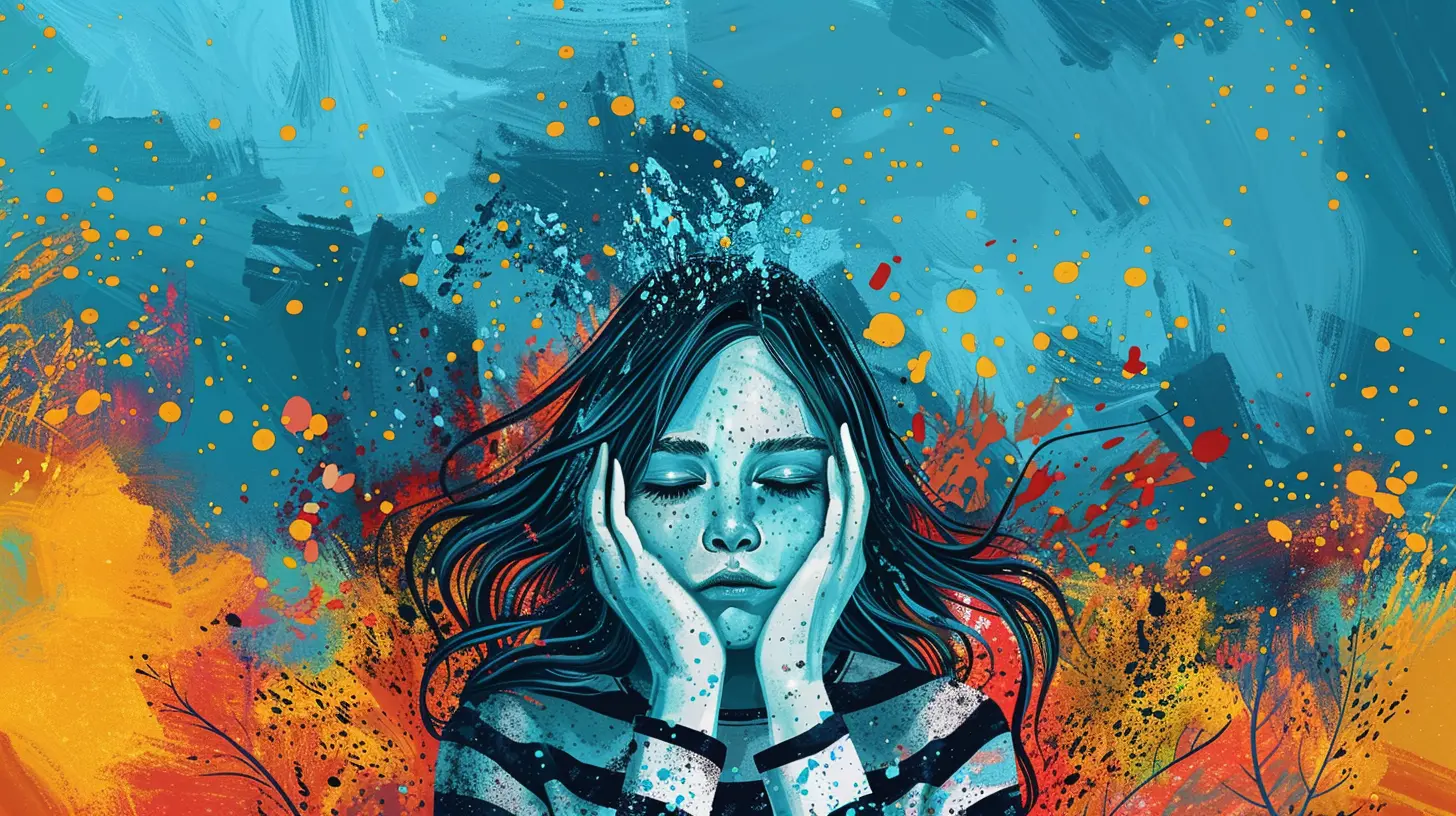Differentiating Between Stress and Anxiety: What You Need to Know
3 September 2025
Let’s face it — life throws stuff at us all the time. From tight deadlines and bills to pay, to worries about the future or our health… it’s no surprise we end up feeling overwhelmed. If you’ve ever felt your heart race before a big presentation or laid awake at night with your mind going a million miles an hour, you might’ve wondered: _Am I stressed, or is this anxiety?_
The truth is, stress and anxiety are often tossed around like they’re the same thing. But they’re not. They’re close cousins, sure — but they have their own quirks and differences. Understanding what sets them apart matters more than you'd think, especially when it comes to managing your mental well-being.
So let’s break it all down — piece by piece — in a way that actually makes sense, no jargon needed.
What is Stress?
Let’s start here. Everyone has experienced stress, right?Stress is your body’s natural response to a challenge or demand. It's like your brain saying, “Hey, we need to get things done — now!” It kicks in when you’re under pressure, and it can be a good thing... in small doses.
Think of stress as the internal alarm system that helps you stay alert, focused, and motivated. It’s your body going into “fight or flight” mode. Say you’ve got an important job interview tomorrow — suddenly, you feel a jolt of energy, your heart’s pounding, and you're super focused. That’s stress doing its job.
Common Causes of Stress:
- Work deadlines- Academic pressure
- Financial struggles
- Relationship conflicts
- Health issues
Physical and Emotional Symptoms of Stress:
- Muscle tension- Headaches
- Upset stomach
- Irritability
- Sleep disturbances
- Feeling overwhelmed or moody
Here’s the kicker: once the stressful task is over, your body should return to its normal state. Stress is usually short-term and tied to a specific situation.
What is Anxiety?
Now, anxiety — it’s in the same family as stress, but it’s a whole different beast.Anxiety is that uneasy, nervous feeling that sticks around even when there’s no immediate threat. It’s like your brain’s stuck on the “what if” channel, constantly predicting doom even when things are okay.
While stress reacts to an external cause (like a traffic jam or public speaking), anxiety can show up without a clear reason. It lingers. It loops. It can grow bigger the more you try to ignore it.
Common Symptoms of Anxiety:
- Excessive worry that’s hard to control- Restlessness or feeling “on edge”
- Racing thoughts or constant overthinking
- Increased heart rate or shortness of breath
- Difficulty concentrating
- Insomnia
Anxiety isn’t just “being a little worried.” When it becomes chronic, it can interfere with your everyday life. We're talking about Generalized Anxiety Disorder (GAD), Panic Disorder, Social Anxiety Disorder — the kind of thing that needs attention and care.
Key Differences Between Stress and Anxiety
Alright, let’s put these two side by side and see where the lines are drawn.| Factor | Stress | Anxiety |
|--------------------------|--------------------------------------------------|--------------------------------------------------|
| Trigger | External (e.g., deadline, argument, traffic jam) | Internal or vague (e.g., feared future events) |
| Duration | Usually short-term | Can be long-term or chronic |
| Response Type | Reaction to situation | Often anticipatory (worrying about “what if”) |
| Physical Symptoms | Similar to anxiety but usually tied to stressor | May continue even when no stressor is present |
| Relief | Goes away once situation resolves | May not go away without intervention |
| Functionality | Can be motivating | Can be paralyzing |
Here’s a quick analogy: stress is like a fire drill — loud and intense, but it ends once the threat goes away. Anxiety is like a smoke detector that won’t stop beeping, even though there’s no fire.
Can Stress Lead to Anxiety?
Absolutely, yes. Chronic stress is a major gateway to anxiety.Imagine you’re juggling a ton of responsibilities — job, family, finances, health. One day, you wake up and realize even small things are making your chest tight. That’s stress slowly evolving into anxiety.
Over time, if your body and brain are constantly in that “high alert” mode, it starts to rewire your thoughts. You begin expecting the worst, doubting yourself, and fearing situations that never bothered you before.
So yeah, stress and anxiety can blur into each other — but catching the signs early can help stop that progression.
How to Manage Stress Before It Becomes Anxiety
Good news? You’re not powerless. Stress can be managed. You just need the right toolkit.1. Identify Your Triggers
Start by asking yourself: _What’s really bothering me?_ Is it work overload? Poor time management? Not enough sleep?Once you’ve nailed the trigger, you can start finding solutions.
2. Practice Time Management
This one’s a game-changer. Get yourself a planner, set small goals, and prioritize what truly matters.3. Exercise Regularly
You’ve heard it before, but it’s true — even a 20-minute walk can release feel-good hormones and reset your mood.4. Get Enough Sleep
Poor sleep fuels both stress and anxiety. Stick to a regular bedtime, limit screen time, and create a calming night routine.5. Talk it Out
Whether it's with a friend, a therapist, or a support group — talking helps. Don’t bottle it up.Managing Anxiety (When It’s More Than Just Stress)
If you’re dealing with anxiety more days than not, or if it’s affecting your quality of life — it’s okay to seek help. Really, it is.1. Consider Therapy
Cognitive Behavioral Therapy (CBT) is one of the most effective treatments for anxiety. It helps you recognize and reframe those unhelpful thoughts.2. Mindfulness and Meditation
Mindfulness is all about grounding yourself in the now — not the “what-ifs.” Even five minutes a day can make a difference.3. Breathing Techniques
Try the 4-7-8 method: inhale for 4 seconds, hold for 7, exhale for 8. It calms your nervous system — fast.4. Medication (If Needed)
There’s no shame in taking medication if it’s prescribed. Think of it like glasses for your brain — a tool to help you see things clearly again.When Should You Be Concerned?
Here’s a gut-check moment.If you feel like:
- You can’t control your worries
- You’ve started avoiding people or situations
- Your sleep, appetite, or mood are consistently off
- You feel a constant sense of dread
Then it's time to talk to a mental health professional. The sooner you get help, the better. Think of it like going to the doctor for persistent physical pain — your mental health is just as important.
You’re Not Alone
Here’s what I want you to remember from all this: feeling stressed or anxious doesn’t mean you’re weak. It means you’re human.We all hit rough patches. And while stress and anxiety might feel like uninvited guests that overstay their welcome, they can be managed — and even transformed into something constructive.
Take it one step at a time. Be patient with yourself. And most importantly, don’t be afraid to reach out for help when you need it.
Because your mental well-being? It matters. And you deserve to feel okay again.
Final Thoughts
Stress and anxiety are both very real, very normal parts of life — but they’re not the same thing. Stress is usually tied to an external situation and fades when that situation resolves. Anxiety, on the other hand, can stick around — even when there’s no clear reason.Knowing the difference can empower you to take the right steps toward feeling better. Don’t wait until things spiral. Tune into your body, your thoughts, and your emotions. You’ve got more control than you think.
And if it ever feels like too much — that’s not something to be ashamed of. It’s a sign to lean on others, not a signal of weakness.
Because hey, we’re all just doing our best out here.
all images in this post were generated using AI tools
Category:
AnxietyAuthor:

Matilda Whitley
Discussion
rate this article
1 comments
Tamara McTiernan
Understanding the distinction between stress and anxiety is crucial for effective management. While stress often stems from external pressures, anxiety can be a persistent internal struggle. Awareness is the first step toward healing.
September 6, 2025 at 4:33 PM

Matilda Whitley
Thank you for your insightful comment! You're absolutely right—recognizing the differences between stress and anxiety is vital for effective coping and management. Awareness truly lays the foundation for healing.


